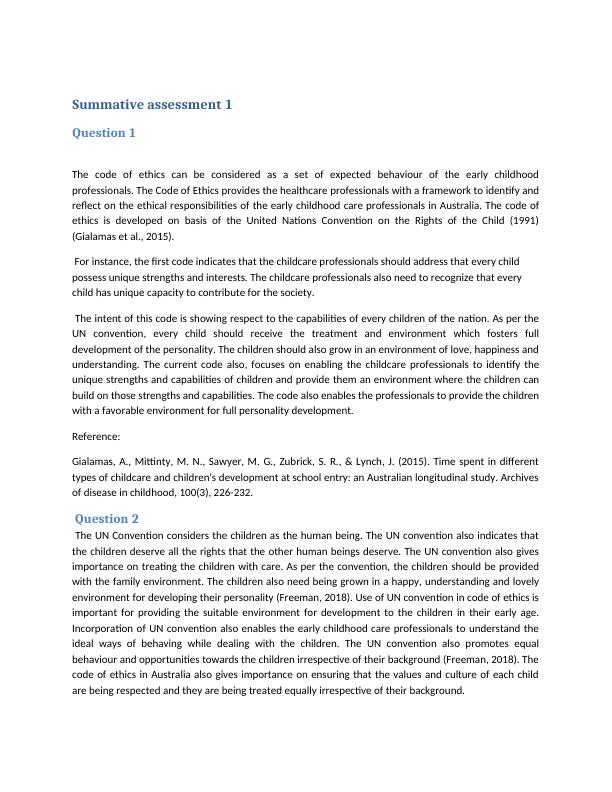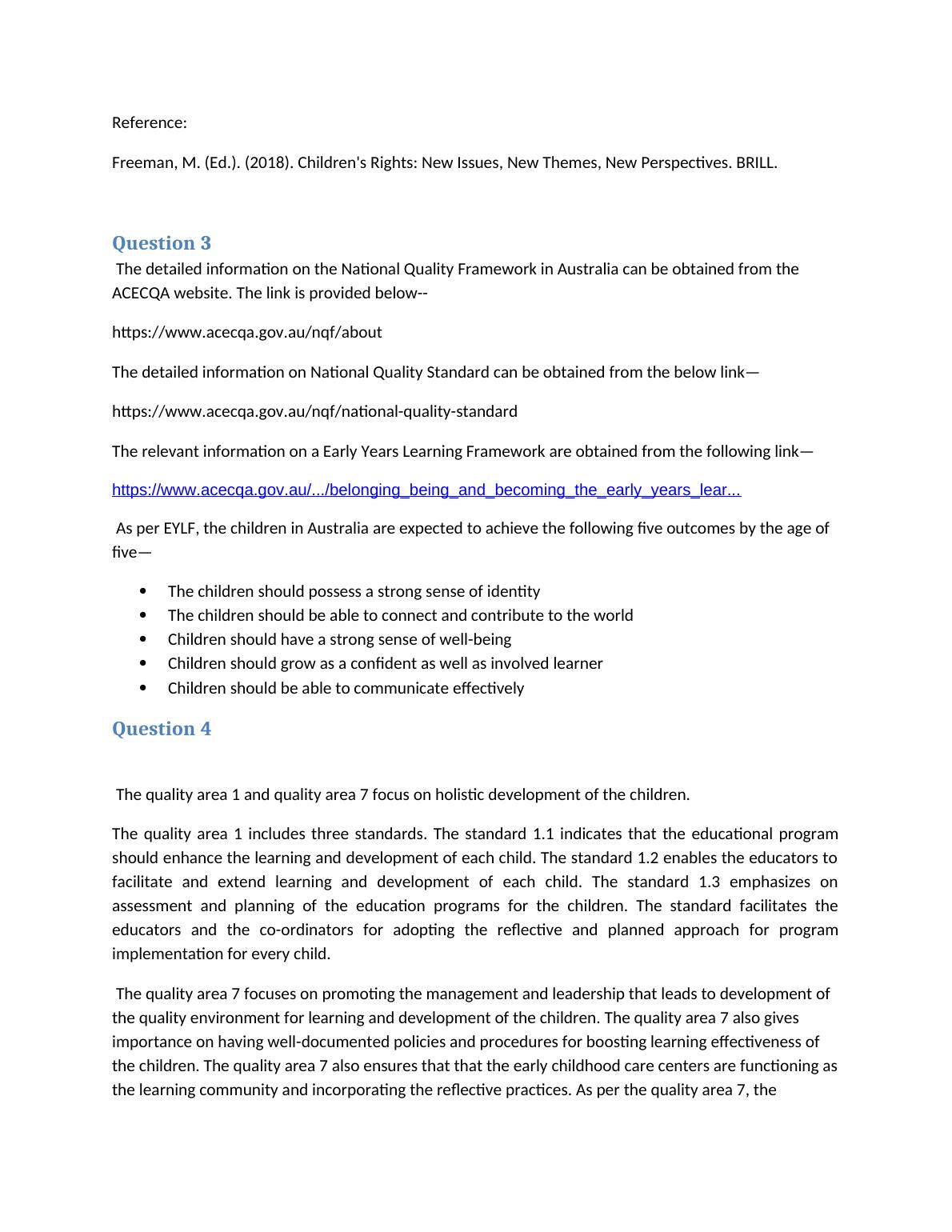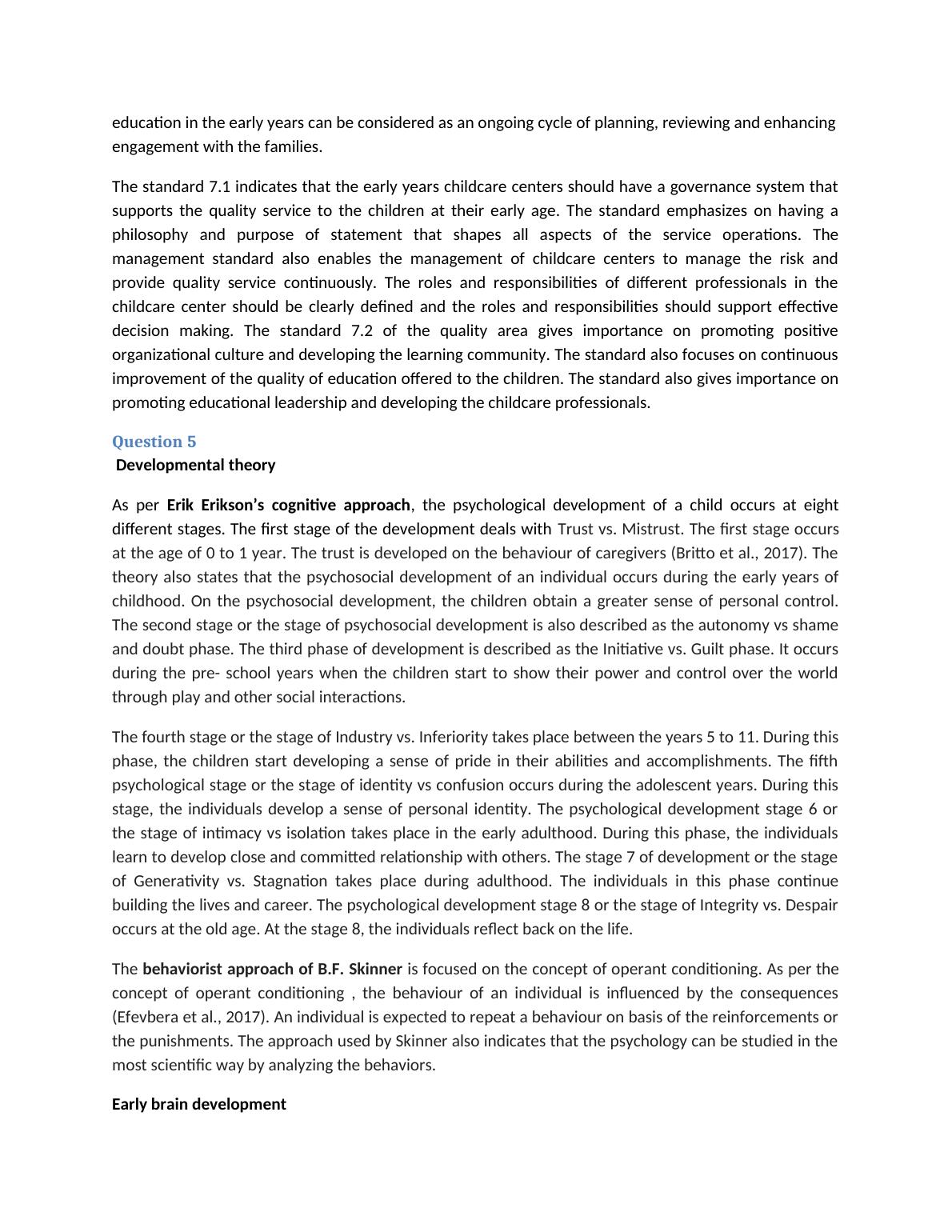Ask a question from expert
Strategies for Holistic Development in Early Childhood Education
9 Pages4284 Words274 Views
Added on 2019-09-22
About This Document
The article discusses the importance of holistic development in early childhood education and provides strategies for physical, social, cognitive, emotional and communication development. It emphasizes the need for early education and care service providers to give special attention to the education and development of the child.
Strategies for Holistic Development in Early Childhood Education
Added on 2019-09-22
BookmarkShareRelated Documents
Summative assessment 1Question 1The code of ethics can be considered as a set of expected behaviour of the early childhoodprofessionals. The Code of Ethics provides the healthcare professionals with a framework to identify andreflect on the ethical responsibilities of the early childhood care professionals in Australia. The code ofethics is developed on basis of the United Nations Convention on the Rights of the Child (1991)(Gialamas et al., 2015). For instance, the first code indicates that the childcare professionals should address that every child possess unique strengths and interests. The childcare professionals also need to recognize that every child has unique capacity to contribute for the society. The intent of this code is showing respect to the capabilities of every children of the nation. As per theUN convention, every child should receive the treatment and environment which fosters fulldevelopment of the personality. The children should also grow in an environment of love, happiness andunderstanding. The current code also, focuses on enabling the childcare professionals to identify theunique strengths and capabilities of children and provide them an environment where the children canbuild on those strengths and capabilities. The code also enables the professionals to provide the childrenwith a favorable environment for full personality development.Reference:Gialamas, A., Mittinty, M. N., Sawyer, M. G., Zubrick, S. R., & Lynch, J. (2015). Time spent in differenttypes of childcare and children's development at school entry: an Australian longitudinal study. Archivesof disease in childhood, 100(3), 226-232. Question 2 The UN Convention considers the children as the human being. The UN convention also indicates thatthe children deserve all the rights that the other human beings deserve. The UN convention also givesimportance on treating the children with care. As per the convention, the children should be providedwith the family environment. The children also need being grown in a happy, understanding and lovelyenvironment for developing their personality (Freeman, 2018). Use of UN convention in code of ethics isimportant for providing the suitable environment for development to the children in their early age.Incorporation of UN convention also enables the early childhood care professionals to understand theideal ways of behaving while dealing with the children. The UN convention also promotes equalbehaviour and opportunities towards the children irrespective of their background (Freeman, 2018). Thecode of ethics in Australia also gives importance on ensuring that the values and culture of each childare being respected and they are being treated equally irrespective of their background.

Reference:Freeman, M. (Ed.). (2018). Children's Rights: New Issues, New Themes, New Perspectives. BRILL.Question 3 The detailed information on the National Quality Framework in Australia can be obtained from the ACECQA website. The link is provided below--https://www.acecqa.gov.au/nqf/aboutThe detailed information on National Quality Standard can be obtained from the below link—https://www.acecqa.gov.au/nqf/national-quality-standardThe relevant information on a Early Years Learning Framework are obtained from the following link—https://www.acecqa.gov.au/.../belonging_being_and_becoming_the_early_years_lear... As per EYLF, the children in Australia are expected to achieve the following five outcomes by the age of five—The children should possess a strong sense of identityThe children should be able to connect and contribute to the world Children should have a strong sense of well-beingChildren should grow as a confident as well as involved learner Children should be able to communicate effectively Question 4 The quality area 1 and quality area 7 focus on holistic development of the children.The quality area 1 includes three standards. The standard 1.1 indicates that the educational programshould enhance the learning and development of each child. The standard 1.2 enables the educators tofacilitate and extend learning and development of each child. The standard 1.3 emphasizes onassessment and planning of the education programs for the children. The standard facilitates theeducators and the co-ordinators for adopting the reflective and planned approach for programimplementation for every child. The quality area 7 focuses on promoting the management and leadership that leads to development of the quality environment for learning and development of the children. The quality area 7 also gives importance on having well-documented policies and procedures for boosting learning effectiveness of the children. The quality area 7 also ensures that that the early childhood care centers are functioning asthe learning community and incorporating the reflective practices. As per the quality area 7, the

education in the early years can be considered as an ongoing cycle of planning, reviewing and enhancingengagement with the families. The standard 7.1 indicates that the early years childcare centers should have a governance system thatsupports the quality service to the children at their early age. The standard emphasizes on having aphilosophy and purpose of statement that shapes all aspects of the service operations. Themanagement standard also enables the management of childcare centers to manage the risk andprovide quality service continuously. The roles and responsibilities of different professionals in thechildcare center should be clearly defined and the roles and responsibilities should support effectivedecision making. The standard 7.2 of the quality area gives importance on promoting positiveorganizational culture and developing the learning community. The standard also focuses on continuousimprovement of the quality of education offered to the children. The standard also gives importance onpromoting educational leadership and developing the childcare professionals.Question 5Developmental theoryAs per ErikErikson’s cognitive approach, the psychological development of a child occurs at eightdifferent stages. The first stage of the development deals with Trust vs. Mistrust. The first stage occursat the age of 0 to 1 year. The trust is developed on the behaviour of caregivers (Britto et al., 2017). Thetheory also states that the psychosocial development of an individual occurs during the early years ofchildhood. On the psychosocial development, the children obtain a greater sense of personal control.The second stage or the stage of psychosocial development is also described as the autonomy vs shameand doubt phase. The third phase of development is described as the Initiative vs. Guilt phase. It occursduring the pre- school years when the children start to show their power and control over the worldthrough play and other social interactions. The fourth stage or the stage of Industry vs. Inferiority takes place between the years 5 to 11. During thisphase, the children start developing a sense of pride in their abilities and accomplishments. The fifthpsychological stage or the stage of identity vs confusion occurs during the adolescent years. During thisstage, the individuals develop a sense of personal identity. The psychological development stage 6 orthe stage of intimacy vs isolation takes place in the early adulthood. During this phase, the individualslearn to develop close and committed relationship with others. The stage 7 of development or the stageof Generativity vs. Stagnation takes place during adulthood. The individuals in this phase continuebuilding the lives and career. The psychological development stage 8 or the stage of Integrity vs. Despairoccurs at the old age. At the stage 8, the individuals reflect back on the life.The behaviorist approach of B.F. Skinner is focused on the concept of operant conditioning. As per theconcept of operant conditioning , the behaviour of an individual is influenced by the consequences(Efevbera et al., 2017). An individual is expected to repeat a behaviour on basis of the reinforcements orthe punishments. The approach used by Skinner also indicates that the psychology can be studied in themost scientific way by analyzing the behaviors.Early brain development

End of preview
Want to access all the pages? Upload your documents or become a member.
Related Documents
CHCECE003 Provide Care for Children - Formative and Summative Assessmentslg...
|5
|1743
|148
Early Childhood Education and Carelg...
|7
|1491
|295
Partnership in Childcare Doclg...
|7
|1530
|411
CHCECE017 Foster the holistic development and wellbeing of the child in early childhood - Activity Planning Sheetlg...
|5
|788
|349
Education and Care of Childrenlg...
|10
|2290
|363
Early Childhood Education in Australia: Quality Area 2 and 3, UN Convention of Rights, Code of Ethics, Physical Activities, Self-Regulation, Sun Protection, Transition Strategieslg...
|6
|2188
|181